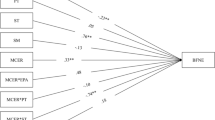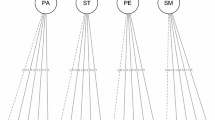Abstract
Emotion Regulation (ER) is an umbrella term that covers both interpersonal and intrapersonal strategies aimed at modifying the duration, intensity and type of emotions that the individuals are experiencing. Although the connection between intrapersonal emotion regulation strategies and psychological distress is well documented, the evidence regarding the association between interpersonal emotion regulation (IER) strategies and psychological distress is rather limited and inconsistent, indicating the need to better understand the conditions in which the association between IER strategies and psychological distress becomes stronger. The current study examined the association of the interaction between maladaptive intrapersonal emotion regulation and IER strategies (i.e., enhancement of positive affect, perspective-taking, social modeling, and soothing) with anxiety and depression. In order to examine this, we asked 318 Turkish individuals (243 females; M = 21.17, SD = 1.89) to complete an online survey which included scales assessing IER, maladaptive cognitive emotion regulation, anxiety and depression. The moderation analyses indicated that interaction of soothing with maladaptive ER strategies was significantly linked with depression, indicating that frequent use of soothing as an IER strategy is linked with lower levels of depression in individuals that rarely use maladaptive emotion regulation strategies (i.e., rumination, and catastrophizing). However, similar results were not observed for anxiety. The findings suggest that the association of especially soothing dimension of IER with depression may change depending on the individual’s use of other emotion regulation strategies and soothing may function adaptively under certain conditions.

Similar content being viewed by others
References
Aldao, A., & Nolen-Hoeksema, S. (2012). When are adaptive strategies most predictive of psychopathology? Journal of Abnormal Psychology, 121(1), 276–281. https://doi.org/10.1037/a0023598.
Aldao, A., Nolen-Hoeksema, S., & Schweizer, S. (2010). Emotion-regulation strategies across psychopathology: A meta-analytic review. Clinical Psychology Review, 30(2), 217–237. https://doi.org/10.1016/j.cpr.2009.11.004.
Allen, V. C., & Windsor, T. D. (2019). Age differences in the use of emotion regulation strategies derived from the process model of emotion regulation: A systematic review. Aging & Mental Health, 23(1), 1–14. https://doi.org/10.1080/13607863.2017.1396575.
Altan-Atalay, A., & Saritas-Atalar, D. (2019). Interpersonal emotion regulation strategies: How do they interact with negative mood regulation strategies in the prediction of anxiety and depression? Current Psychology, 1-7. https://doi.org/10.1007/s12144-019-00586-2.
Arbuckle, J. L. (2019). Amos (version 26.0) [computer program]. Chicago: IBM SPSS.
Bilgel, N., & Bayram, N. (2010). Depresyon anksiyete stres ölçeğinin (DASS-42) Türkçeye uyarlanmış şeklinin psikometrik özellikleri. Nöropsikiyatri Arşivi, 47(2), 118–126. https://doi.org/10.4274/npa.5344.
Cohen, J. (1992). A power primer. Psychological Bulletin, 112(1), 155–159. https://doi.org/10.1037//0033-2909.112.1.155.
Garnefski, N., & Kraaij, V. (2006). Relationships between cognitive emotion regulation strategies and depressive symptoms: A comparative study of five specific samples. Personality and Individual Differences, 40(8), 1659–1669. https://doi.org/10.1016/j.paid.2005.12.009.
Garnefski, N., & Kraaij, V. (2018). Specificity of relations between adolescents’ cognitive emotion regulation strategies and symptoms of depression and anxiety. Cognition and Emotion, 32(7), 1401–1408. https://doi.org/10.1080/02699931.2016.1232698.
Garnefski, N., Kraaij, V., & Spinhoven, P. (2001). Negative life events, cognitive emotion regulation and emotional problems. Personality and Individual Differences, 30(8), 1311–1327. https://doi.org/10.1016/S0191-8869(00)00113-6.
Gökdağ, C., Sorias, O., Kıran, S., & Ger, S. (2019). Kişilerarası duygu düzenleme ölçeğinin türkçeye uyarlanması ve psikometrik özelliklerinin incelenmesi. Türk Psikiyatri Dergisi, 29(3), 147–153. https://doi.org/10.5080/u23067.
Gross, J. J. (2015). Emotion regulation: Current status and future prospects. Psychological Inquiry, 26(1), 1–26. https://doi.org/10.1080/1047840X.2014.940781.
Hayes, A. F. (2013). Introduction to mediation, moderation, and conditional process analysis: A regression-based approach. New York: Guilford Press.
Henrich, J., Heine, S. J., & Norenzayan, A. (2010). The weirdest people in the world? Behavioral and Brain Sciences, 33(2–3), 61–83. https://doi.org/10.1017/S0140525X0999152X.
Hofmann, S. G. (2014). Interpersonal emotion regulation model of mood and anxiety disorders. Cognitive Therapy and Research, 38(5), 483–492. https://doi.org/10.1007/s10608-014-9620-1.
Hofmann, S. G., Carpenter, J. K., & Curtiss, J. (2016). Interpersonal emotion regulation questionnaire (IERQ): Scale development and psychometric characteristics. Cognitive Therapy and Research, 40(3), 341–356. https://doi.org/10.1007/s10608-016-9756-2.
Hu, L. T., & Bentler, P. M. (1999). Cutoff criteria for fit indexes in covariance structure analysis: Conventional criteria versus new alternatives. Structural Equation Modeling: A Multidisciplinary Journal, 6(1), 1–55. https://doi.org/10.1080/10705519909540118.
Huh, H. J., Kim, K. H., Lee, H. K., & Chae, J. H. (2017). The relationship between childhood trauma and the severity of adulthood depression and anxiety symptoms in a clinical sample: The mediating role of cognitive emotion regulation strategies. Journal of Affective Disorders, 213, 44–50. https://doi.org/10.1016/j.jad.2017.02.009.
John, O. P., & Gross, J. J. (2004). Healthy and unhealthy emotion regulation: Personality processes, individual differences, and lifespan development. Journal of Personality, 72(6), 1301–1334. https://doi.org/10.1111/j.1467-6494.2004.00298.x.
Koç, M. S., Aka, B. T., Doğruyol, B., Curtiss, J., Carpenter, J. K., & Hofmann, S. G. (2019). Psychometric properties of the Turkish version of the interpersonal emotion regulation questionnaire (IERQ). Journal of Psychopathology and Behavioral Assessment, 41(2), 294–303. https://doi.org/10.1007/s10862-019-09732-3.
Kuo, B. C. (2011). Culture’s consequences on coping: Theories, evidences, and dimensionalities. Journal of Cross-Cultural Psychology, 42(6), 1084–1100. https://doi.org/10.1177/0022022110381126.
Lee, Y., & Park, J. H. (2019). Effects of social comparison orientation on social anxiety in middle school students and moderating role of maladaptive cognitive emotion regulation strategies. Korean Journal of Child Studies, 40(1), 39–50. https://doi.org/10.5723/kjcs.2019.40.1.39.
Liao, K. Y. H., & Wei, M. (2011). Intolerance of uncertainty, depression, and anxiety: The moderating and mediating roles of rumination. Journal of Clinical Psychology, 67(12), 1220–1239. https://doi.org/10.1002/jclp.20846.
Liddell, B. J., & Williams, E. N. (2019). Cultural differences in interpersonal emotion regulation. Frontiers in Psychology, 10. https://doi.org/10.3389/fpsyg.2019.00999.
Lovibond, S. H., & Lovibond, P. F. (1995a). Manual for the depression anxiety stress scales. Sydney: Psychology Foundation; 1995.
Lovibond, P. F., & Lovibond, S. H. (1995b). The structure of negative emotional states: Comparison of the depression anxiety stress scales (DASS) with the Beck depression and anxiety inventories. Behaviour Research and Therapy, 33(3), 335–343. https://doi.org/10.1016/0005-7967(94)00075-U.
Martin, R. C., & Dahlen, E. R. (2005). Cognitive emotion regulation in the prediction of depression, anxiety, stress, and anger. Personality and Individual Differences, 39(7), 1249–1260. https://doi.org/10.1016/j.paid.2005.06.004.
Min, J. A., Yu, J. J., Lee, C. U., & Chae, J. H. (2013). Cognitive emotion regulation strategies contributing to resilience in patients with depression and/or anxiety disorders. Comprehensive Psychiatry, 54(8), 1190–1197. https://doi.org/10.1016/j.comppsych.2013.05.008.
Nolen-Hoeksema, S., & Aldao, A. (2011). Gender and age differences in emotion regulation strategies and their relationship to depressive symptoms. Personality and Individual Differences, 51(6), 704–708. https://doi.org/10.1016/j.paid.2011.06.012.
Pruessner, L., Holt, D. V., Gölz, R., Sevcenko, N., Hofmann, S. G., & Backenstrass, M. (2020). Psychometrische eigenschaften der deutschsprachigen version des interpersonal emotion regulation questionnaire. Diagnostica, 66(1), 62–73. https://doi.org/10.1026/0012-1924/a000239.
Soleimani, S., Mofrad, F., & Kareshki, H. (2018). Interpersonal emotion regulation questionnaire (IERQ) in Persian speaking population: Adaption, factor structure and psychometric properties. International Journal of Applied Behavioral Sciences, 3(4), 42–49. https://doi.org/10.22037/ijabs.v3i4.16483.
Tuna, E., & Bozo, Ö. (2012). The cognitive emotion regulation questionnaire: Factor structure and psychometric properties of the Turkish version. Journal of Psychopathology and Behavioral Assessment, 34(4), 564–570. https://doi.org/10.1007/s10862-012-9303-8.
Uncu, Y., Bayram, N., & Bilgel, N. (2006). Job related affective well-being among primary health care physicians. European Journal of Public Health, 17(5), 514–519. https://doi.org/10.1093/eurpub/ckl264.
Vanderhasselt, M.-A., Koster, E. H. W., Onraedt, T., Bruyneel, L., Goubert, L., & De Raedt, R. (2014). Adaptive cognitive emotion regulation moderates the relationship between dysfunctional attitudes and depressive symptoms during a stressful life period: A prospective study. Journal of Behavior Therapy and Experimental Psychiatry, 45(2), 291–296. https://doi.org/10.1016/j.jbtep.2014.01.003.
Watson, D., Clark, L. A., Weber, K., Assenheimer, J. S., Strauss, M. E., & McCormick, R. A. (1995). Testing a tripartite model: II. Exploring the symptom structure of anxiety and depression in student, adult, and patient samples. Journal of Abnormal Psychology, 104(1), 15–25. https://doi.org/10.1037//0021-843x.104.1.15.
Availability of Data
The dataset generated during and/or analysed during the currennt study are available from the corresponding author on reasonable request.
Funding
This research did not receive any specific grant from funding agencies in the public, or not-for-profit sector.
Author information
Authors and Affiliations
Corresponding author
Ethics declarations
Conflict of Interest
Authors declare that there is no potential conflict of interest pertaining this submission to “Current Psychology.”
Ethics Approval
All procedures performed in studies involving human participants were in accordance with the ethical standards of the Koc University ethical committee and with the 1964 Helsinki Declaration and its later amendments or comparable ethical standards.
Consent to Participate
Informed consent was obtained from all participants.
Additional information
Publisher’s Note
Springer Nature remains neutral with regard to jurisdictional claims in published maps and institutional affiliations.
Rights and permissions
About this article
Cite this article
Ray-Yol, E., Ülbe, S., Temel, M. et al. Interpersonal emotion regulation strategies: can they function differently under certain conditions?. Curr Psychol 41, 2364–2371 (2022). https://doi.org/10.1007/s12144-020-00771-8
Published:
Issue Date:
DOI: https://doi.org/10.1007/s12144-020-00771-8




